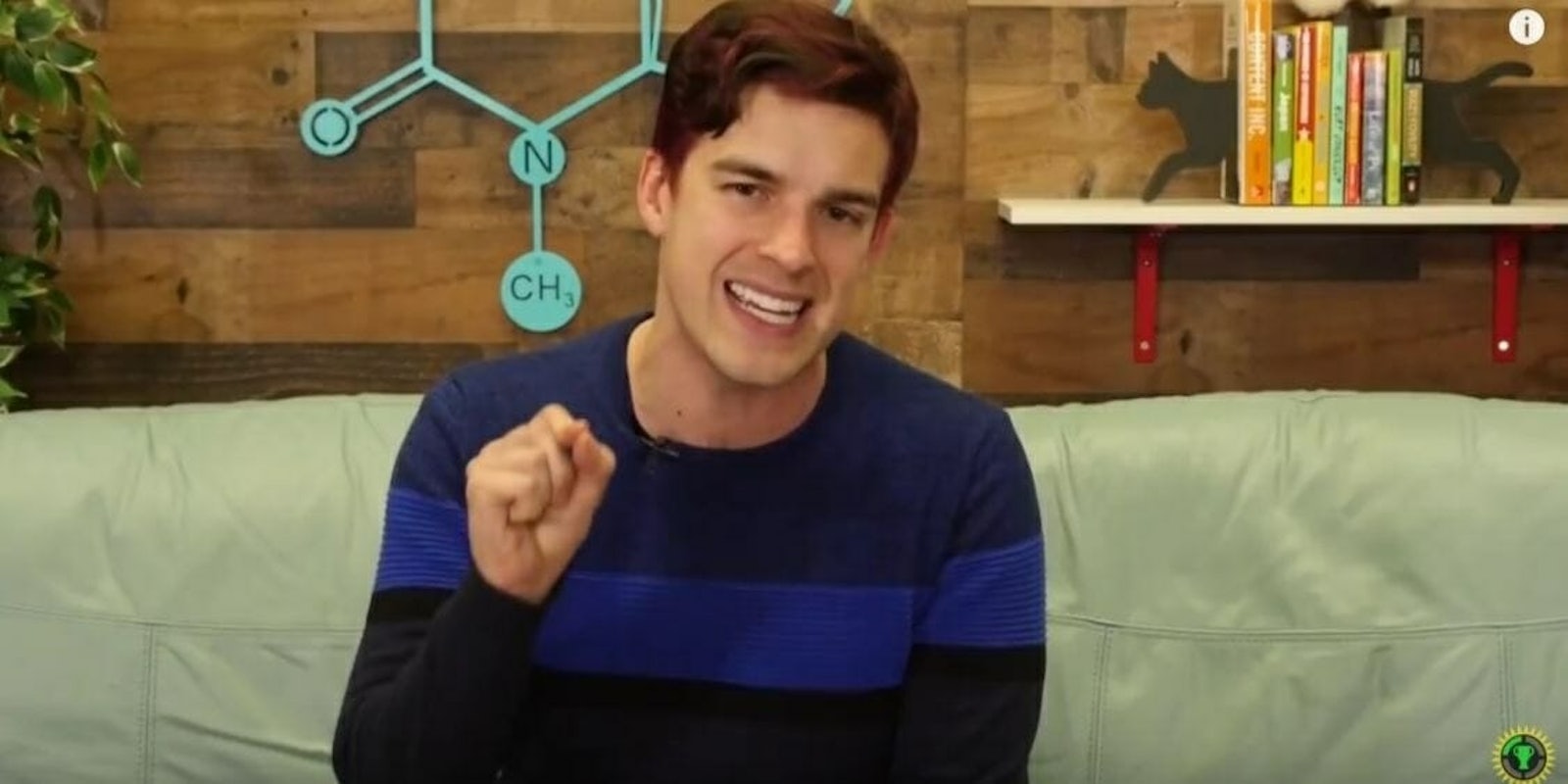A digital network named Defy Media which represented some of the most well-known YouTube channels shut down in November, and soon after, creators like Shane Dawson and Smosh co-founder Anthony Padilla spoke out against the multi-channel network’s actions.
On Thursday, the Game Theorists channel accused Defy Media of stealing $1.7 million from him and other YouTubers. In his video, the Game Theorists’ Matthew Patrick said Defy Media took the earnings of dozens of creators.
“Collectively, us 50 [YouTubers] had $1.7 million stolen from us,” he said. “If that wasn’t bad enough, in my case, it was taken by someone who I thought I knew. Someone I thought I could trust.”
Patrick, aka MatPat, said he was once hired by Defy Media as the head of audience development and said he had a blast working there for a year before leaving to become a full-time YouTuber—his channel currently has more than 11 million subscribers.
In November, Defy Media—which ran channels from creators like Smosh and Clevver—announced it was shutting down, saying in a statement, “We are extremely proud of what we accomplished here at Defy and in particular want to thank all the employees who worked here. We deeply regret the impact that this has had on them today … Unfortunately, market conditions got in the way of us completing our mission.”
According to Variety, Defy Media had produced 75 YouTube series for channels that had more than 140 million followers on YouTube and in social media. Like most multi-channel networks (MCNs), Defy Media was expected to help with brand deals for its clients and to help protect against copyright issues.
If a YouTuber is in business with an MCN, YouTube sends their money to the MCN, which then takes its cut from the earnings before sending on the rest to the creator. Patrick said the more time he spent working for an MCN, “the more I started to see the questionable way they ran their business.” It’s like, Patrick said, if your employer sent your paycheck to the water company and the electric company before the remaining money was passed along to you.
“Everyone gets their cut and then finally you get access to the money you rightfully own,” he said. “It’s still your money that you earned at your job. It went through everyone else’s hands first. That’s the loophole the MCN started to realize they could exploit to make themselves look bigger.”
Patrick said that if an MCN had a big pot of money—money that actually belonged to YouTube creators—it would make itself look more attractive to outside investors. Since most of it wasn’t actually the MCN’s money, Patrick called it a Ponzi scheme.
At one point, Patrick said that Defy asked its partners if it could delay paying their ad revenue for a month. Later, Patrick said he discovered “they kept the money to make their books look better for the investors.”
One major problem in this social media system is that being a part of an MCN is important for a big-time YouTuber.
“Nowadays, it’s required for copyright protection,” Patrick said. “If creators want to have copyright protection for their videos to prevent wrongful reuploads or false claims from movie studios or music labels, you have to be a part of an MCN. Based on the system that YouTube has set up, those companies are the only ones with the tools that can offer those protections.”
According to Patrick, Ally bank now owns the money that Defy Media held and it has to determine who rightfully gets it.
Meanwhile, Defy Media—which had raised $70 million in 2017—is facing multiple lawsuits.
Defy hasn’t commented since it closed shop, but one Defy source told Digiday, “Mistakes you make that are write-offs in a big company are catastrophic at a small company. We didn’t do some basic blocking and tackling about where we were spending money and being realistic about what to invest in.”
Now, Patrick is unsure if he’ll ever get the money he’s owed. The least he can do, he said in his video, is make sure everyone knows his story and how to help prevent your own financial pitfalls in the future.
Update 2:28pm CT, Jan. 29: As the Verge points out, it doesn’t seem likely that any of the YouTubers who collectively lost $1.7 million will get that money returned to them. As the bank Ally tweeted, it stands to lose more money than anybody.
Ally made a loan to Defy Media that it was unable to pay back after experiencing excessive losses and the owners refused to continue to support the company. (1/2)
— Ally (@Ally) January 25, 2019
Defy is being liquidated by a professional hired by their Board of Directors, and Ally stands to lose most of its loan. We are sympathetic to everyone caught up in this mess, and unfortunately Ally is also experiencing a substantial loss as a result. (2/2)
— Ally (@Ally) January 25, 2019


